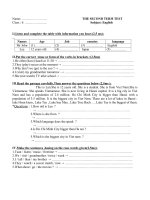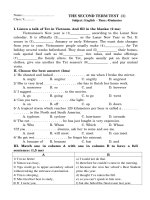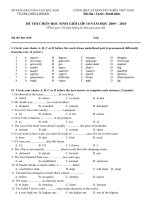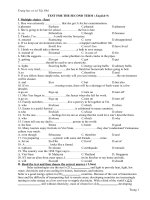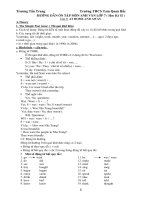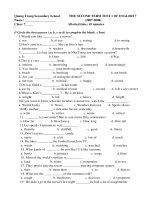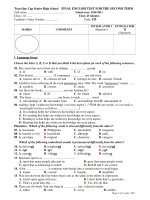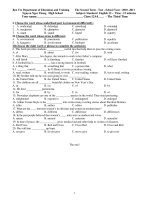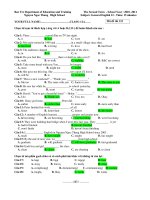The second term tests
Bạn đang xem bản rút gọn của tài liệu. Xem và tải ngay bản đầy đủ của tài liệu tại đây (64.87 KB, 6 trang )
Name:.....................................
Class: 9............
THE SECOND TERM TEST (1)
Subject: English - Time: 45minutes
I. Listen a talk of Tet in Vietnam. And fill in the blanks: (2 ms)
Vietnamese’s New year is (1)____________ according to the Lunar New
calendar. It is officially (2)____________ as the Lunar New Year or Tet. It
occurs in (3)____________ January or early February. The exact date changes
from year to year. Vietnamese people usually make (4)____________ for Tet
holiday several weeks beforehand. They clean and (5)____________ their homes,
cook special food such as (6)____________ rice cakes, and make offerings
(7)____________the family alters. On Tet, people usually put on their new
clothes, give one another the Tet season’s (8)____________ , and pay mutual
visits.
II. Choose the best answer: (2ms)
1/ He shouted and looked . . . . . . . . . . . . . . . . at me when I broke the mirror.
A. angry B. angrier C. angrily D. angriest
2/ She is very tired . . . . . . . . . . . . . . . . she has to finish her home work.
A. moreover B. so C. and D. however
3/ I suggest . . . . . . . . . . . . . . . . to the movies.
A. go B. going C. to go D. went
4/ Can you turn . . . . . . . . . . . . . . . .the light.
A. on B. off C. up D. down
5/ A tropical storm which reaches 120 kilometers per hour is called a . . . . . . . .
. . . . . . . . in the North and South America.
A. typhoon B. cyclone C. hurricane D. tornado
6/ The car . . . . . . . . . . . . . . . . he has just bought is very expensive.
A. Who B. Whom C. Which D. Whose
7/If you . . . . . . . . . . . . . . . .Joanna, ask her to come and see me.
A. meet B. will meet C. meet D. can meet
8/ He got wet . . . . . . . . . . . . . . . . he forgot his raincoat.
A. because of B. because C. but D. and
III. Match one in column A with one in column B to have a full
sentence: (1,5 ms)
A B
1/ I’m no better
2/ Simon was busy,
3/ Nga could go to upper-secondary school
without taking the entrance examination
4/ Tim is sleeping,
5/ Mai tried her best to study,
6/ If I were you,
a) I would not do that.
b) therefore he couldn’t come to the meeting.
c) because she won her school’s Best Student
prize this year.
d) thought I’ve taken the bill.
e) so you can’t speak to him now.
f) but she failed the final exam last year.
IV. Combine each pair of sentences into one as directed in the
parentheses: (1,5ms)
1/ We couldn’t get tickets. We queued for an hour. (Use “although”)
2/ The map is out of date. You were looking at. (Use a relative pronoun)
3/ Hai is Lan’s older brother. He just walked pass. (Use a relative pronoun)
V. Write with the cues given: (1m)
1/ I/ write/ you/ the pollution made/ factory/ near/ school.
2/ I/ look/ to/ see/ reply.
VI. Read then answer the questions: (2 ms)
In many countries nowadays, electricity, gas and water are necessities.
Companies which produce household goods realize that consumers want
products that both work effectively and save money.
In North America, for example, household lighting accounts 10% to 15%
of the electrical bill, but this amount can be reduced by replacing an ordinary
100-wat light bulb with an energy-saving one. Consumers can save about US$7
to US$21 per bulb doing so.
In Europe, when you buy some electrical goods such as refrigerators,
freezers, and washing machines, there is a labeling scheme telling you how
energy efficient each model is, so you can compare different appliances and
then choose which one to buy. The final result is that these innovations will
save money as well as conserve the earth’s resources.
* Questions:
1/ Are electricity, gas and water necessities in many countries nowadays?
2/ What can companies which produce household goods realize from consumers?
3/ Can consumers save about US$7 to US$17 per bulb doing so when replacing
an ordinary 100-wat light bulb with an energy-saving one in Europe?
4/ Where is there a labeling scheme telling you how energy efficient each
model is?
THE END
Good luck to you!
ANSWER KEYS (1)
I. Listen a talk of Tet in Vietnam. And fill in the blanks: (2 ms)
1/ celebrated 2/ known 3/ late 4/ preparation
5/ decorate 6/ sticky 7/ on 8/ greetings
II. Choose the best answer: (2ms)
1/ C 2/ D 3/ B 4/ A
5/ C 6/ C 7/ C 8/ B
III. Match one in column A with one in column B to have a full
sentence: (1,5 ms)
1- d 2- b 3- c 4- e 5- f 6- a
IV. Combine each pair of sentences into one as directed in the
parentheses: (1,5ms)
1/ Although we queued for an hour, we couldn’t get tickets..
2/ The map which you were looking at is out of date.
3/ Hai, who just walked pass, is Lan’s older brother.
V. Write with the cues given: (1m)
1/ I’m writing/ write to you about the pollution made by the factory near my
school.
2/ I look/ am looking forward to seeing your reply.
VI. Read then answer the questions: (2 ms)
1/ Yes, they are.
2/ Companies which produce household goods realize that consumers want
products that both work effectively and save money.
3/ No, they can’t.
4/ There is a labeling scheme telling you how energy efficient each model is in
Europe.
Tape script
Vietnamese’s New year is celebrated according to the Lunar New
calendar. It is officially known as the Lunar New Year or Tet. It occurs in late
January or early February. The exact date changes from year to year.
Vietnamese people usually make preparation for Tet holiday several weeks
beforehand. They clean and decorate their homes, cook special food such as
sticky rice cakes, and make offerings on the family alters. On Tet, people
usually put on their new clothes, give one another the Tet season’s greetings ,
and pay mutual visits.
Name:.....................................
Class: 9............
THE SECOND TERM TEST (2)
Subject: English - Time: 45minutes
I. Listen a talk of Tet in Vietnam. And fill in the blanks: (2 ms)
Vietnamese’s New year is (1)____________ according to the Lunar New
calendar. It is officially (2)____________ as the Lunar New Year or Tet. It
occurs in (3)____________ January or early February. The exact date changes
from year to year. Vietnamese people usually make (4)____________ for Tet
holiday serveral weeks beforehand. They clean and (5)____________ their
homes, cook special food such as (6)____________ rice cakes, and make offerings
(7)____________the family alters. On Tet, people usually put on their new
clothes, give one another the Tet season’s (8)____________ , and pay mutual
visits.
II. Choose the best answer: (2ms)
1/ I suggest . . . . . . . . . . . . . . . . to the movies.
A. to go B. go C. went D. going
2/ He shouted and looked . . . . . . . . . . . . . . . . at me when I broke the mirror.
A. angry B. angrily C. angrier D. angriest
3/ Can you turn . . . . . . . . . . . . . . . .the light.
A. up B. down C. off D. on
4/ He got wet . . . . . . . . . . . . . . . . he forgot his raincoat.
A. because B. because of C. and D. but
5/ The car . . . . . . . . . . . . . . . . he has just bought is very expensive.
A. Which B. Who C. Whom D. Whose
6/ She is very tired . . . . . . . . . . . . . . . . she has to finish her home work.
A. moreover B. so C. and D. however
7/If you . . . . . . . . . . . . . . . .Joanna, ask her to come and see me.
A. will meet B. meet C. to meet D. can meet
8/ A tropical storm which reaches 120 kilometers per hour is called a . . . . . . . .
. . . . . . . . in the North and South America.
A. typhoon B. cyclone C. hurricane D. tornado
III. Match one in column A with one in column B to have a full
sentence: (1,5 ms)
A B
1/ Tim is sleeping,
2/ I’m no better
3/ Mai tried her best to study,
4/ Nga could go to upper-secondary school
without taking the entrance examination
5/ Simon was busy,
6/ If I were you,
a) I would not do that.
b) therefore he couldn’t come to the meeting.
c) thought I’ve taken the bill.
d) because she won her school’s Best Student
prize this year.
e) so you can’t speak to him now.
f) but she failed the final exam last year.
IV. Combine each pair of sentences into one as directed in the
parentheses: (1,5ms)
1/ We couldn’t get tickets. We queued for an hour. (Use “Even thought”)
2/ The building has now been rebuilt. It was destroyed in the fire. (Use a
relative pronoun)
3/ Lan is Binh’s younger sister. She just walked pass. (Use a relative pronoun)
V. Write with the cues given: (1m)
1/ We/ write/ you/ the pollution made/ factory/ near/ school.
2/ We/ look/ to/ see/ reply.
VI. Read then answer the questions: (2 ms)
In many countries nowadays, electricity, gas and water are necessities.
Companies which produce household goods realize that consumers want
products that both work effectively and save money.
In North America, for example, household lighting accounts 10% to 15%
of the electrical bill, but this amount can be reduced by replacing an ordinary
100-wat light bulb with an energy-saving one. Consumers can save about US$7
to US$21 per bulb doing so.
In Europe, when you buy some electrical goods such as refrigerators,
freezers, and washing machines, there is a labeling scheme telling you how
energy efficient each model is, so you can compare different appliances and
then choose which one to buy. The final result is that these innovations will
save money as well as conserve the earth’s resources.
* Questions:
1/ What are necessities in many countries nowadays?
2/ Do companies which produce household goods realize that consumers want
products that both work effectively and save money?
3/ Can the electrical bill be reduced by replacing an ordinary 100-wat light bulb
with an energy-saving one in North America?
4/ Where can you buy an appliance with a labeling scheme telling you how
energy efficient each model is?
THE END
Good luck to you!
